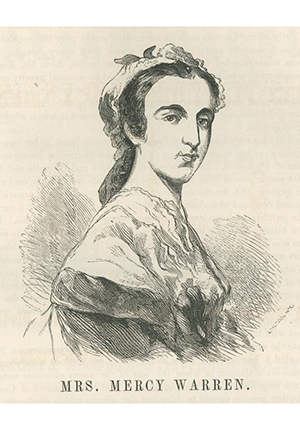Historic Document
Observations on the New Constitution (1788)
Mercy Otis Warren | 1788

Library Company of Philadelphia
Summary
Mercy Otis Warren was deeply connected in the world of Massachusetts Revolutionary politics. The sibling of James Otis, she became friends and regular correspondents with many of the state’s leaders, including John, Abigail, and Samuel Adams. A poet and pamphleteer in her own right, throughout the imperial crisis she had urged her fellow colonists to resist British tyranny. This experience conditioned her zealous opposition to the federal Constitution over a decade later, captured so powerfully in her pamphlet, Observations on the New Constitution, published in early 1788 under the pseudonym, “A Columbia Patriot.” (Only much later would it be attributed to her.) Warren viewed the Constitution from the perspective of the “Spirit of ’76”—the original animating principles of the Revolution—and explained in vivid, poetic prose why the proposed system of government posed much the same threat to American liberty as the British government once had. There was a tragic irony here, as Warren saw it: the same population that had risked their lives to escape distant, centralized tyranny now appeared willing, a mere decade later, to settle for much the same at home. In hopes of awakening Americans from their slumber, Warren reminded readers of the republican tenets to which they had once clung as well as the imperial governance under which they had once suffered.
Selected by

William B. Allen
Emeritus Dean of James Madison College and Emeritus Professor of Political Science at Michigan State University

Jonathan Gienapp
Associate Professor of History at Stanford University
Document Excerpt
Mankind may amuse themselves with theoretick systems of liberty, and trace its social and moral effects on sciences, virtue, industry and every improvement of which the human mind is capable; but we can only discern its true value by the practical and wretched effects of slavery; and thus dreadfully will they be realized, when the inhabitants of the Eastern States are dragging out a miserable existence, only on the gleanings of their fields; and the Southern, blessed with a softer and more fertile climate, are languishing in hopeless poverty; and when asked, what is become of the flower of their crop, and the rich produce of their farms—they may answer in the hapless stile of the Man of La Mancha, — "The steward of my Lord has seized and sent it to Madrid.” Or, in the more literal language of truth, the exigencies of government require that the collectors of the revenue should transmit it to the Federal City.
Animated with the firmest zeal for the interest of this country, the peace and union of the American States, and the freedom and happiness of a people who have made the most costly sacrifices in the cause of liberty,—who have braved the power of Britain, weathered the convulsions of war, and waded thro’ the blood of friends and foes to establish their independence and to support the freedom of the human mind; I cannot silently witness this degradation without calling on them, before they are compelled to blush at their own servitude, and to turn back their languid eyes on their lost liberties — to consider, that the character of nations generally changes at the moment of revolution. …
But the revolutions in principle which time produces among mankind, frequently exhibits the most mortifying instances of human weakness; and this alone can account for the extraordinary appearance of a few names, once distinguished in the honourable walks of patriotism, but now found in the list of the Massachusetts assent to the ratification of a Constitution, which, by the undefined meaning of some parts, and the ambiguities of expression in others, is dangerously adapted to the purposes of an immediate aristocratic tyranny; that from the difficulty, if not impracticability of its operation, must soon terminate in the most uncontrouled despotism. …
Though it has been said by Mr. Wilson and many others, that a Standing-Army is necessary for the dignity and safety of America, yet freedom revolts at the idea, when the Divan, or the Despot, may draw out his dragoons to suppress the murmurs of a few, who may yet cherish those sublime principles which call forth the exertions, and lead to the best improvements of the human mind. It is hoped this country may yet be governed by milder methods than are usually displayed beneath the bannerets of military law.—Standing armies have been the nursery of vice and the bane of liberty from the Roman legions to the establishment of the artful Ximenes, and from the ruin of the Cortes of Spain, to the planting of the British cohorts in the capitals of America : — By the edicts of an authority vested in the sovereign power by the proposed constitution, the militia of the country, the bulwark of defence, and the security of national liberty if no longer under the controul of civil authority; but at the rescript of the Monarch, or the aristocracy, they may either be employed to extort the enormous sums that will be necessary to support the civil list — to maintain the regalia of power — and the splendour of the most useless part of the community, or they may be sent into foreign countries for the fulfilment of treaties, stipulated by the President and two-thirds of the Senate. …
This people have not forgotten the artful insinuations of a former Governor, when pleading the unlimited authority of parliament before the legislature of the Massachusetts; nor that his arguments were very similar to some lately urged by gentlemen who boast of opposing his measures, “with halters about their necks.”
We were then told by him, in all the soft language of insinuation, that no form of government, of human construction can be perfect — that we had nothing to fear — that we had no reason to complain — that we had only to acquiesce in their illegal claims, and to submit to the requisition of parliament, and doubtless the lenient hand of government would redress all grievances, and remove the oppressions of the people: — Yet we soon saw armies of mercenaries encamped on our plains— our commerce ruined — our harbours blockaded — and our cities burnt….The banners of freedom were erected in the wilds of America by our ancestors, while the wolf prowled for his prey on the one hand, and more savage man on the other; they have been since rescued from the invading hand of foreign power, by the valor and blood of their posterity; and there was reason to hope they would continue for ages to illumine a quarter of the globe, by nature kindly separated from the proud monarchies of Europe, and the infernal darkness of Asiatic slavery. …
Since their dismemberment from the British empire, America has, in many instances, resembled the conduct of a restless, vigorous, luxurious youth, prematurely emancipated from the authority of a parent, but without the experience necessary to direct him to act with dignity or discretion. Thus we have seen her break the shackles of foreign dominion, and all the blessings of peace restored on the more honourable terms: She acquired the liberty of framing her own laws, choosing her own magistrates, and adopting manners and modes of government the most favourable to the freedom and happiness of society. But how little have we availed ourselves of these superior advantages: The glorious fabric of liberty successfully reared with so much labor an assiduity totters to the foundation, and may be blown away as the bubble of fancy by the rude breath of military combinations, and politicians of yesterday.




